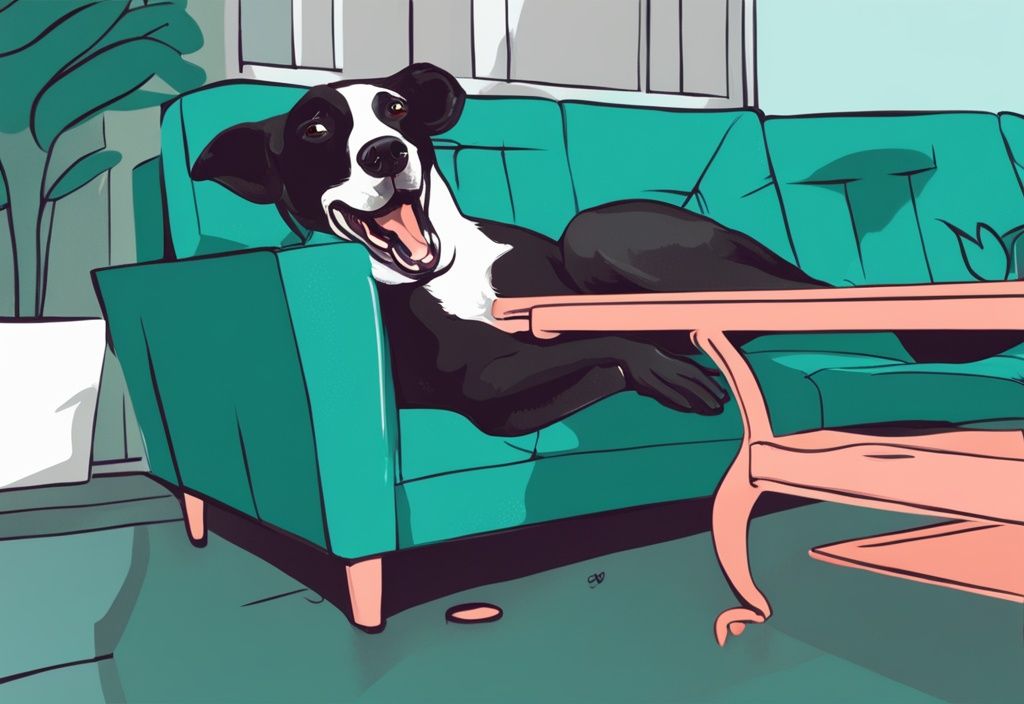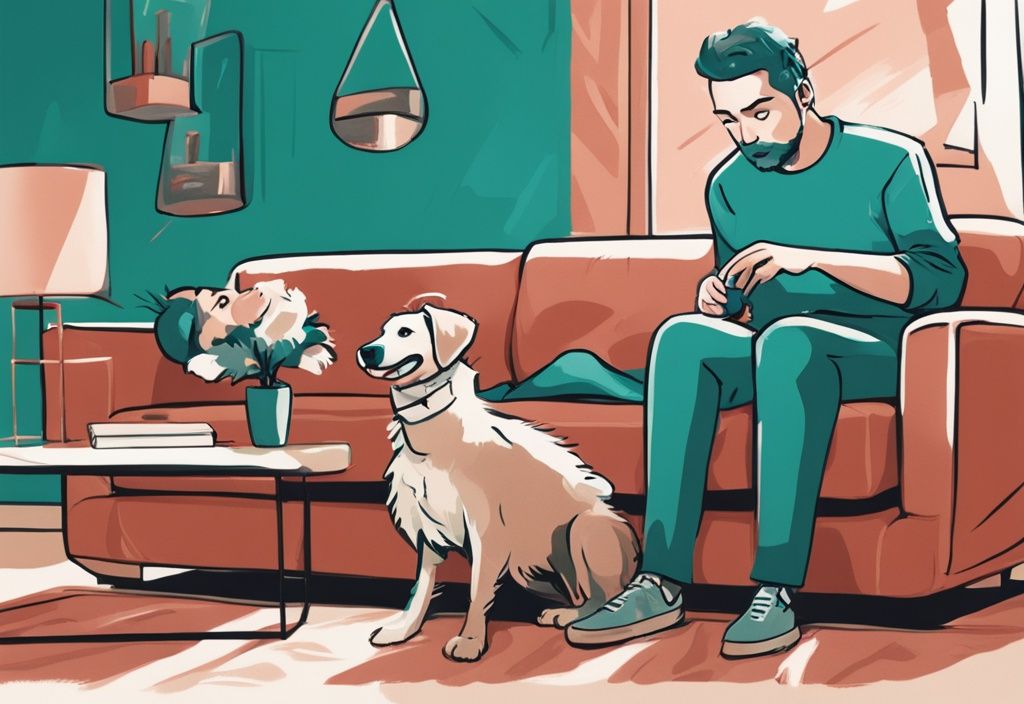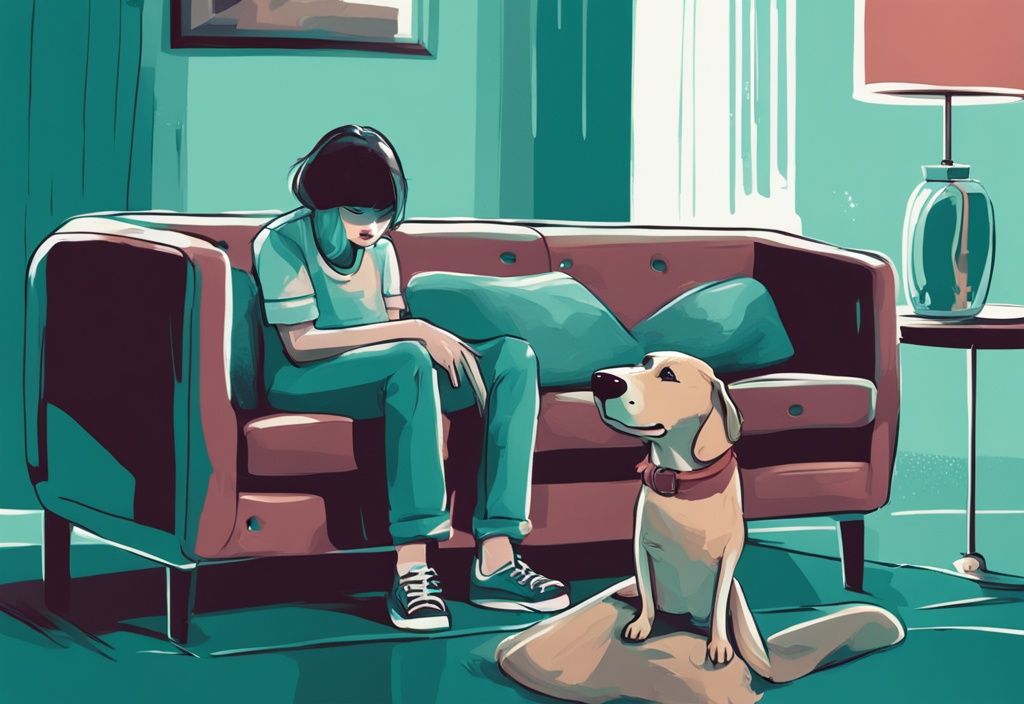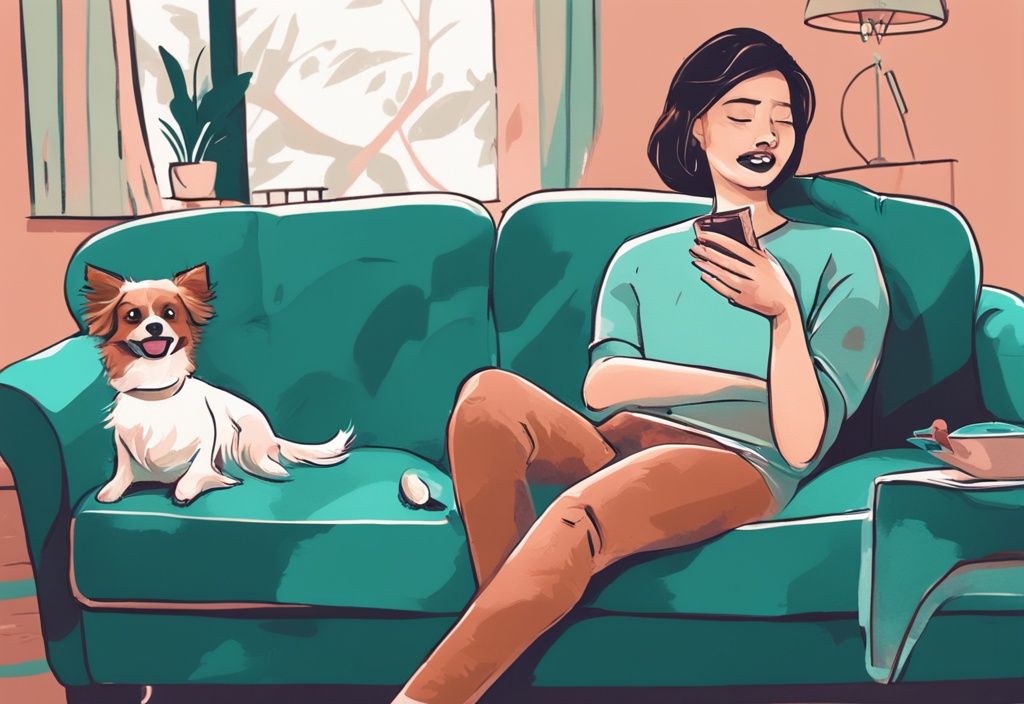Got a couch-licker on your hands? While it might seem adorable, have you ever stopped and wondered, “why does my dog lick the couch?” You’ve come to the right place, my fellow dog-loving friend!
In this tailor-made post for us pet parents, we’ll explore the mystery of this slobbery habit. Leads us into all sorts of paths, doesn’t it? Boredom, anxiety, perhaps health concerns? Buckle up because we’re going to jump right into the thick of it.
We’ll sniff out the reasons behind couch-licking and uncover how to manage this behavior. Get ready for a healthier, happier home with your furry friend – where your couch remains slobber-free!
Decoding the Reasons Behind Your Dog’s Couch Licking
When you notice your furry friend giving the couch an enthusiastic licking, it can leave you puzzled. But don’t worry—there are several possible explanations for this quirky behavior.
Is it Boredom or Lack of Stimulation?
Is your dog licking the couch because they’re bored out of their mind? It’s a strong possibility! When dogs have excess energy and nothing to do, they might turn to licking furniture to occupy themselves. I’ve caught my Border Collie, Max, doing this after a lazy day indoors.
To curb this, try enriching your dog’s environment. Toss in some puzzle toys that challenge their brain or maybe a good game of fetch, as mental stimulation is just as important for your dog’s well-being. You can find more ways to keep your dog mentally stimulated [here](https://www.petmd.com/dog/general-health/ways-to-keep-dog-mentally-stimulated). Not only will it give them a solid workout, but it’ll also keep that curious tongue off your couch. Trust me, a well-engaged dog is a happy dog!
Anxiety and Stress: A Trigger for Couch Licking
Does your dog get a bit anxious, turning your couch into a personal stress-reliever? Dogs often use licking as a way to soothe themselves when feeling anxious. Think of it as their version of a stress ball. This behavior tends to ramp up during changes in their environment—like moving homes or a sudden shift in your daily schedule.
Combat this with consistent exercise and social interactions. Regular play dates and walks can do wonders, burning off nervous energy. Plus, a stable routine can offer your pooch the comfort and predictability they need.
Could Medical Conditions Cause Couch Licking?
Sometimes, the reasons are more than just mental. Digestive problems, nausea, and even cognitive issues can lead your dog to lick the couch excessively. If you think this might be the case, consulting a vet is super important.
Early diagnosis can catch health issues before they become a bigger problem. Max once had a bout of gastrointestinal discomfort, and the vet’s advice made all the difference. Regular check-ups can keep your furry friend healthy and your couch free from slobber.
Behavioral Issues: Another Possibility
Got a dog who just can’t stop licking the couch? It might be OCD. Dogs with obsessive-compulsive disorder can exhibit repetitive behaviors like intense couch licking, which can really mess with their daily life.
If you suspect OCD, a mix of behavioral therapy and possibly vet-prescribed medications can help. Redirecting your dog’s focus—try a fun toy or some obedience training—can also work wonders. I’ve found that keeping Max occupied helps reduce his more quirky behaviors!
The Role of Attraction to Odors and Tastes
Dogs and their noses—what a combo! Sometimes, it’s just the lingering odors and tastes on the couch that attract them. Maybe it’s the crumbs from yesterday’s snack or even the smell of human sweat.
Regularly cleaning your couch with enzyme-based cleaners can tackle those tempting scents. Since I started doing this, Max has been way less interested in our sofa. Bye-bye, couch-licking!

By understanding the reasons behind your dog’s couch-licking habit, you can take the right steps to manage and even eliminate this behavior. Happy snuggling with a slobber-free couch!
Identifying What Makes Your Dog Lick the Couch
When it comes to figuring out why does my dog lick the couch, it’s all about putting on those detective glasses and observing. Your dog might be trying to tell you something, and the clues are all around!
Role of Observation and Monitoring in Identifying Triggers
Understanding why does my dog lick the couch often begins with careful observation and monitoring. By watching your dog closely, you can identify specific triggers or patterns in their licking behavior. Pay attention to whether the licking coincides with certain events, times of day, or changes in the environment. For example, does your dog start licking the couch more when there’s a lot of noise outside, or perhaps when you return from being away?
Keeping a behavior diary can be particularly useful in pinpointing these triggers. Document each instance of licking, noting the time, any activities leading up to it, and changes in the home environment. Over time, this log can reveal patterns that help you understand the root cause of your dog’s behavior.
Consulting a Veterinarian: When and Why
When asking why does my dog lick the couch, medical conditions should not be overlooked. If you suspect that health issues might be contributing to this behavior, consulting a veterinarian becomes essential. A vet will be able to conduct examinations and tests to either rule out or diagnose any underlying conditions that could be causing your dog’s excessive licking.
This timely consultation is crucial because appropriate treatment can significantly improve your dog’s quality of life. For instance, gastrointestinal problems or dental pain might be at play, and treating these conditions could reduce or eliminate the licking behavior. Ensuring your dog receives the right medical care helps in managing the behavior effectively, safeguarding both your pet’s health and your furniture.
Strategies to Prevent and Address Couch Licking
Increasing physical activity is a fundamental approach to alleviating why does my dog lick the couch. Regular walks and playtime significantly reduce a dog’s excess energy, which often contributes to boredom—a key trigger for licking behavior. Additionally, mental stimulation is equally crucial. Engaging your dog with puzzle toys, training sessions, and interactive games helps keep their mind occupied and reduces the urge to engage in unwanted licking. To ensure sustained interest, regularly rotating toys can prevent your dog from getting bored with their playthings.
How Mental and Physical Stimulation Can Help
Ever wonder why Max, my super energetic Border Collie, doesn’t fall into the couch-licking habit? It’s because he gets both physical and mental workouts every day! Just imagine those regular walks and playtime sessions burning off that extra steam—like a toddler after a fun day at the park. And mental stimulation? That’s the secret sauce! Puzzle toys, interactive games, and training sessions keep their sharp minds busy. Plus, switching up the toys keeps things exciting, kind of like rotating through your favorite Netflix shows.
Ways to Reduce Your Dog’s Anxiety and Stress
Creating a Consistent Routine for Comfort
Creating a cozy, predictable routine can be a game-changer in reducing your dog’s anxiety and their couch-licking antics. Max thrives on his routine. Predictable feeding, walking, and playtimes give dogs that comforting structure, like knowing your favorite coffee shop always has your go-to order. When everything is consistent, they feel more secure and less stressed.
Calming Products that May Help
Sometimes, a little external help can make a big difference. Pheromone sprays, diffusers, or anxiety wraps can bring an extra layer of calmness to your furry friend, making a huge dent in the “why does my dog lick the couch” mystery. I’ve tried calming supplements with Max—those with L-theanine or CBD can make a noticeable difference. Always good to have a quick chat with your vet before introducing anything new.
Exploring Behavior Modification Techniques
Behavior modification is key to managing and reducing couch licking behavior. Positive reinforcement is highly effective; rewarding your dog for alternative behaviors can help redirect their focus away from the couch. Commands like “leave it” can be trained to divert your dog’s attention. Importantly, avoid punishing your dog, as this can heighten anxiety and stress, potentially exacerbating the licking behavior.
When Medical Interventions Could be Necessary
Potential Treatments for Underlying Health Issues
If your dog’s couch licking persists, it may be linked to underlying health issues. Treating diagnosed medical conditions such as gastrointestinal problems or dental pain can alleviate the discomfort causing your dog to lick excessively. Medications prescribed by a veterinarian can effectively address health-related causes of licking. Regular veterinary check-ups are essential to ensure the continuous health and management of these conditions.
Managing the Environment to Discourage Licking
Importance of Keeping Your Couch Clean
Keeping your couch clean is a straightforward yet effective strategy to discourage your dog from licking. Regular cleaning removes scents and tastes that may attract your dog to the fabric. Enzyme-based cleaners are particularly effective in eliminating odors completely, thus reducing the likelihood of licking behavior.
Protective Covers and Deterrent Sprays: Do They Work?
Protective covers can safeguard your couch from damage and deter your dog from licking. Additionally, deterrent sprays with bitter tastes can be applied to areas your dog frequently licks. These sprays discourage licking due to their unpleasant taste, helping to redirect your dog’s behavior.

Recognizing When It’s Time to Seek Professional Help
Persistent or excessive couch licking might seem like a quirky habit, but it can signal deeper issues needing expert intervention. If you’re pondering, “why does my dog lick the couch incessantly?” despite trying various strategies, this could be a red flag. Persistent licking that doesn’t stop even after providing distractions, exercise, or other interventions suggests it could be time to seek professional advice.
Additionally, if you spot signs of distress, anxiety, or potential medical issues in your dog that don’t improve with home-based solutions, it’s wise to consider professional help. Compulsive licking that interferes with your dog’s normal activities and quality of life is a key indicator that an expert might be needed to offer tailored solutions.
Signs that Indicate a Professional Intervention is Needed
When the question “why does my dog lick the couch” leads you down a rabbit hole of unanswered questions, it might be time to enlist some professional help. If distractions, extra walks, or puzzle toys aren’t cutting it, the persistent licking could be a cry for more serious attention.
Watch out for signs such as distress, anxiety, or medical issues. Persistent licking that hampers your dog’s daily activities and enjoyment of life is a crucial sign that it’s time to consult an expert for a tailored plan.
Choosing the Right Help: Veterinarian, Behaviorist, or Trainer
Deciding which professional to turn to can be tricky, especially when you’re stuck wondering, “why does my dog lick the couch.” Each type of expert brings a unique perspective and approach to tackling your dog’s behavior:
- Veterinarian: A vet is your go-to for identifying and treating any medical conditions that could be causing the licking. Issues like gastrointestinal problems, dental concerns, or cognitive dysfunctions need to be ruled out or treated effectively.
- Dog Behaviorist: For psychological and behavioral issues, a certified dog behaviorist is a gem. These pros specialize in understanding and mitigating the psychological triggers—like anxiety, stress, or even canine OCD—that can lead to compulsive couch licking.
- Dog Trainer: If your dog’s licking is more about needing better discipline or training, a skilled trainer can help. Trainers focus on behavior modification techniques, using positive reinforcement and commands to redirect your dog from the couch.
Selecting the right professional based on your dog’s specific needs ensures a comprehensive approach to tackling the licking behavior. This not only improves your dog’s well-being but also restores a harmonious vibe at home.
FAQs: Clarifying Common Questions about Couch Licking
Ever found yourself puzzled by your dog’s couch-licking habits? You’re not alone! These FAQs dive into the reasons behind this behavior and offer practical solutions. Whether you’re dealing with separation anxiety or just a curious canine, we’ve got you covered.
Why does my dog lick the couch when I’m not home?
– Ever noticed your couch looking a little more worn when you get home? Dogs might lick the couch when you’re not around due to separation anxiety or boredom. In your absence, your furry friend’s licking serves as a self-soothing mechanism to cope with stressful situations. Think of it as their version of a comfort blanket!
Is it normal for dogs to lick furniture?
– A little lick here and there? Totally normal. This can be part of self-grooming or just your dog’s way of exploring their world. But if your pup is constantly at it, that could be a sign of underlying issues like anxiety, boredom, or even medical conditions. Time for some detective work!

Can licking the couch be harmful to my dog?
– Yes, licking the couch can be harmful. Imagine your dog munching on fabric fibers or licking up residue from cleaning products—yikes! Persistent licking might also signal untreated stress or medical issues that need your attention. Max once got into Whiskers’ catnip stash, and it took a vet trip to untangle that one!
Which chew toys or activities can deter my dog from licking the couch?
– Looking for ways to distract your couch-licking furball? Dental chews, puzzle toys, and durable chew toys are great alternatives. Interactive toys like treat-dispensing balls keep dogs entertained and mentally stimulated, reducing the urge to turn your couch into a lick-fest.
How do I know if my dog’s couch licking is due to a medical condition?
– Wondering if something more serious is at play? Keep an eye out for changes in appetite, weight, or behavior. If your dog is licking persistently or frequently, it’s time for a vet visit to rule out or diagnose any medical conditions. When Max started his relentless paw-licking marathon, the vet helped us pinpoint a hidden allergy. Better safe than sorry, right?
Wrapping It Up: Understanding and Addressing Your Dog’s Couch Licking
Wondering why your dog can’t seem to keep its tongue off the couch? The reasons behind this quirky behavior can vary—from boredom and anxiety to medical issues. The key to tackling it lies in identifying the cause and implementing a tailored strategy, ensuring your furry friend is both happy and healthy.
Providing Adequate Mental and Physical Stimulation
One typical culprit for couch licking is a lack of mental and physical stimulation. Just like Max, my Border Collie, dogs are intelligent creatures craving engagement. Imagine being stuck in a room with nothing to do—you’d probably find some odd ways to pass the time too! Daily walks, playtime, and interactive toys can work wonders in keeping boredom at bay. Consider incorporating puzzle toys and training sessions; they’re fantastic for challenging your dog mentally while keeping their energy levels balanced.
Managing Environmental Factors
Sometimes, the problem isn’t your pup but the environment. Dogs are drawn to the leftover scents and tastes embedded in your couch fabric. Regular cleaning with enzyme-based cleaners can help remove these irresistible attractants. If you’re dealing with pet hair elsewhere, check out our guide on how to get dog hair out of the car for effective solutions. To safeguard your furniture further, think about using protective covers and deterrent sprays—turn your couch into a less appealing target for that curious tongue.
Employing Behavior Modification Techniques
Switching gears to training, positive reinforcement is your best friend here. Reward your dog for good behavior instead of scolding them for the bad—trust me, it works like a charm with my dog Max. Commands like “leave it” can effectively redirect your dog’s attention to more appropriate activities. A stern “no” might just amplify their anxiety, making matters worse. Keep it light, and keep it fun!
Seeking Professional Help When Necessary
If your dog’s couch-licking habit remains a mystery despite your efforts, it’s probably time to seek professional help. A veterinarian can diagnose any underlying medical issues. Similarly, a certified dog behaviorist or trainer can devise a plan specifically tailored to address obsessive-compulsive or anxiety-driven behaviors. This professional intervention not only preserves your furniture but also ensures your dog’s overall well-being.
In summary, answering the question, “why does my dog lick the couch,” involves a multifaceted approach. By identifying the root cause, ensuring ample stimulation, managing environmental factors, and seeking professional advice when necessary, you can curb this behavior. Ultimately, it’s all about promoting a happier and healthier life for your beloved pet.
